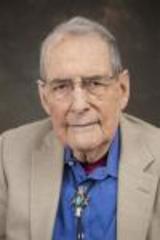Timothy Goldsmith
Andrew W. Mellon Professor of Molecular, Cellular & Developmental Biology; Professor of Ophthalmology & Visual Science
 Tim Goldsmith. BA Cornell University, Ph.D., Harvard University, faculty member at Yale since 1961, when you started in science, the biochemistry of vision was just being worked out. Through your research, you have been able to show that—even though insect eyes are anatomically and developmentally totally different structures from vertebrate eyes—retinal is also the chromophore in insect visual pigments. This seminal discovery led to one of the important generalizations in visual science: that Vitamin A is the basis for color vision in all animals. Not content with this discovery, your research went on to show the limits of the generalization you yourself had discovered, demonstrating that the mechanism by which the visual pigment is regenerated after use is different in insects and in vertebrates. In recent years you have gone on to study the visual world that humans can’t see, doing important work on the mechanism by which arthropods can see polarized light, and that hummingbirds can use true color discrimination in learning paradigms. Your more than 100 papers, and your book and textbook on the relation between evolution and behavior, make you an international leader in your field.
Tim Goldsmith. BA Cornell University, Ph.D., Harvard University, faculty member at Yale since 1961, when you started in science, the biochemistry of vision was just being worked out. Through your research, you have been able to show that—even though insect eyes are anatomically and developmentally totally different structures from vertebrate eyes—retinal is also the chromophore in insect visual pigments. This seminal discovery led to one of the important generalizations in visual science: that Vitamin A is the basis for color vision in all animals. Not content with this discovery, your research went on to show the limits of the generalization you yourself had discovered, demonstrating that the mechanism by which the visual pigment is regenerated after use is different in insects and in vertebrates. In recent years you have gone on to study the visual world that humans can’t see, doing important work on the mechanism by which arthropods can see polarized light, and that hummingbirds can use true color discrimination in learning paradigms. Your more than 100 papers, and your book and textbook on the relation between evolution and behavior, make you an international leader in your field.
Despite its demands, your research did not absorb the whole of your life. During the years when Professor Mary Helen Goldsmith was Master of Silliman College, you shared with her a busy life with undergraduates, finding out on the ground what residential and extracurricular engagement were all about and contributing greatly to them. Indeed, you always have been a loyal member of Yale College, participating in many committees and taking a serious interest in teaching and learning – and you have exercised your interest in pedagogy not only in local, but also in national ways. In the past several decades, as Chair of the National Academy of Sciences Biological Sciences Curriculum Committee, you have invested passion and effort in the national problem of science education in this country. Your work has resulted in an influential National Research Council Book “Biology Education in the Nation’s Schools.” To this day you continue to be a strong voice for science education, as evidenced by your recent editorial in Science Magazine. At Yale, you have practiced what you have preached nationally by devoting special time, care and effort to the teaching of science for non-scientists in your course on the biological nature of human nature.
As your formal retirement frees you for further engagement in science, and no doubt also in education, the University to which you gave such distinguished service and loyalty gives you thanks and praise.
Tribute Editor: Penelope Laurans